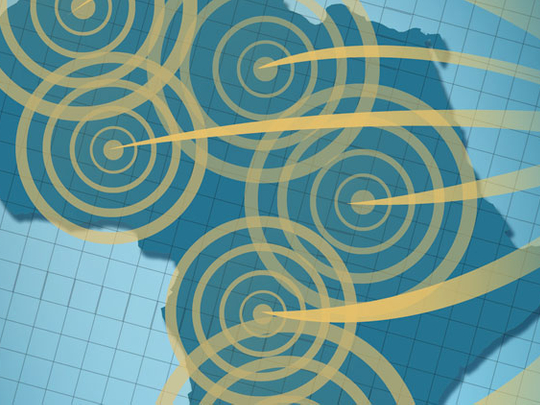
The rapid changes in international diplomacy require all countries to restructure their relations as well as economic, political and security alliances. The subsequent scenario reflects the shifting interests of the countries and blocs they form a part of in the 21st century.
There is now an effort to redistribute power centres according to these defined interests, particularly as emergent countries, notably China, are fully aware of the new dynamics and have begun to make the most of opportunities in countries rich in natural and human resources and thus forming an important pillar in international relations.
The economic aspect is the main focus of this attention. Upcoming struggles for supremacy will be more economic in nature and their success will determine gains in other areas, including political and military arenas. As the UAE and GCC countries can be ranked within the universe of emerging countries with a prominent role in shaping the global economy, it is imperative for them to work in two parallel directions so as to occupy prominence on the new map of changing international relations and develop their endogenous capacities to defend their own interests.
The first direction lies in enhancing Gulf integration and completion of the common market, while the second involves the restructuring of the GCC’s international relations in harmony with the new global balance of power.
Let’s take the experience of China in Africa as an example. China has made several important strategic and economic breakthroughs in the African continent, an approach which began with the announcement of the formation of the Forum on China-Africa Cooperation in 2000 and has since contributed to increasing the volume of trade between the two by 16 times to $166 billion (Dh609.58 billion) in 2011, a growth of 83 per cent over 2009 levels.
As a result, Chinese investments in Africa were up by 60 per cent in 2011 to approximately $15 billion compared to 2009. China also plans to double its loans to African states to up to $20 billion to support infrastructure, agriculture and small and medium-sized enterprises. Currently, there are more than 2,000 Chinese companies operating in African countries.
On soft infrastructure, China has trained 30,000 African people, granted scholarships and sent 1,500 experts to Africa as part of technical assistance and co-operation. It also means that while China continues to work in this direction on more than one level, the US is trying to curb the extent of Chinese penetration on the continent.
An interesting question that arises here is to why all this interest in Africa? The continent is rich with vast opportunities, especially in natural resources on which the world is increasingly dependent, such as oil, gas, uranium, agricultural commodities and water sources.
Subsequently, Western companies are now trying to enter the African continent through Chinese companies based there, according to Le Monde, the French daily. This happens despite the fact that the African countries are former colonies of European countries such as France, Britain, Italy, Belgium and Portugal.
Now, some emerging countries, especially the UAE and other GCC nations, are trying to make the most of China’s rich experience. The GCC has historical ties and deep-rooted cultural and economic relations and strategic interests with African countries, with Arabs and Muslims constituting a sizable portion of the African fabric.
The right beginning to this approach lies within developing the foundation for future collaboration and economic relations between the GCC nations and African countries, with a focus on developing the infrastructure of trade, particularly given that the UAE is the first regional trade centre in the Gulf region and the Middle East.
The absence or lack of infrastructure in the past was one of the weaknesses that prevented the development of economic and trade relations between developing countries. The GCC made up for this shortfall through developing relations with promising African markets with economic potential and natural resources. Recently, the UAE launched direct airline routes to most capitals and business cities on the continent.
In view of the growing relations and investment flow between Africa and China, the advanced infrastructure in the UAE can tap the rapid growth in relations between Africa and Asia. The UAE will constitute a major gateway and transition point between Africa and China, which will be of great economic and commercial benefits to the GCC as well as to Africa and China.
INFRASTRUCTURE ISSUES
However, despite the volume of economic and commercial relations between China and Africa, the infrastructure that serves these partnerships are still weak and suffer from a lack of services. This qualifies the UAE to play a complementary role in this aspect.
Furthermore, UAE-Africa cooperation will contribute to the revitalisation of many of the UAE’s non-oil sectors, most notably trade, financial services and tourism.
Since African countries have rare natural resources and minerals, many Chinese businesses are already utilising these resources for their raw material needs. The UAE and other GCC states can do the same for their own domestic industries, apart from benefiting from the vast agricultural lands where they can invest in.
In this regard, Africa will occupy an important position due to its vast resources, including those of a strategic character, such as uranium, oil and aluminium.
To give the UAE’s approach towards Africa a comprehensive strategic dimension, the need is for an integrated GCC-African co-operation project, so that African countries can benefit from the strategic location and sophisticated infrastructure in the UAE to connect with the rest of the world.
This may include the possibility of organising a Gulf-African forum to develop bilateral relations and overcome many of the current obstacles. The UAE Federation of Chambers of Commerce and Industry or the General Secretariat of the GCC can adopt such an initiative.












